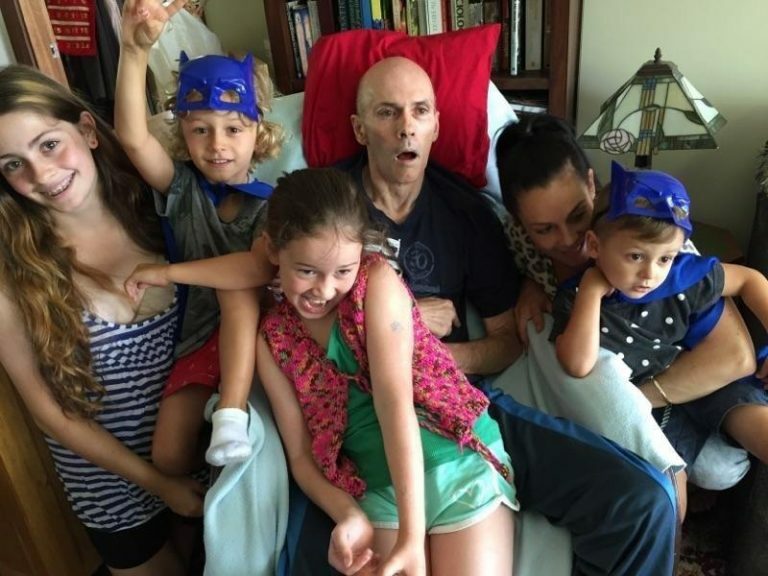Dementia – the tsunami our nation is not ready for
Look at these happy faces. It was Christmas 2015 and Bob Rushton was surrounded by love. He was mute, incontinent, bedridden and in rapid decline, yet his childrens love was unending.

Some days you meet families and are immediately reminded your research work is urgent.
I hadnt met Bob Rushton before he visited NeuRA, but I wish I had. He had served our country with pride in the army. He had arranged complex medical evacuations of critically ill people from around the world. He loved camping, his mates, and our great outdoors. He was the salt of the earth.
Most of all, Bob loved his family his wife, Lisa; his children, Stephanie, Amy and Poppy; and then later, his two grandsons.
The day he visited NeuRA, aged only 48, it was clear that all of this was being rapidly stolen from him.
Bob died of dementia. He was 53.
Allow me to be clear dementia is a terminal illness, and its the tsunami that our nation is not ready for.
Nearly one million Australians will have a form of dementia by 2050. Simply put, there arent enough of us to care for that many people. It will be the biggest expense to the health budget, and will overtake heart disease as the leading cause of death in Australia.
These statistics are frightening; however, the human suffering alone calls us to immediate action.
You can make a difference, by supporting our research.
Will you help achieve our vision of making diseases like dementia a thing of the past?
Dementia can be terrifyingly aggressive. This is one small example; Bob could have played rugby for Australia, but the same man weighed just 45kg when he passed away his body and brain suffering tremendous and irreversible damage.
Dementia is also cruel, as Lisa will tell you. I invited her to share some insight into what it has been like for her and the girls, which you can read below. In its brutal honesty, her story may cause you to think of someone you love. That is the very person we want desperately to help.
Please also remember Stephanie, Amy and Poppy. Stephanie lost her dad, and has two beautiful boys who will never know their wonderful grandfather. Amy was only 14, and at a time when friends are crucial, she shared that they simply didnt know how to talk to her about her dad. Poppy was even younger, aged 9. She was feeling left out at seeing other kids with their dads, and told of how unfair it all was.
Each family has Christmas traditions. Bobs was to wrap the presents on Christmas Eve.
Lisa had to do that this year.
We will Discover, Conquer and Cure.
Your support in the past has achieved wonderful progress in understanding and treating disorders such as dementia. Your support has also made the work of the Sydney Brain Bank possible, which is used by researchers around the world. Years earlier, Bob granted NeuRA the incredible opportunity to learn more about dementia by agreeing to donate his brain. His precious gift will contribute to research now, and for decades to come.
Defeating dementia takes time, but thanks to you, we have vision and a new hope. Each time you give, another piece of the dementia puzzle will be solved. Together, we will Discover, Conquer and Cure.
Prof Lars Ittner is excited for the future. He is driven to develop drug therapies that will revolutionise the treatment of dementia and motor neurone disease. A summary of Prof Ittners current research can be downloaded below. Your support makes his research possible.
Will you support Prof Ittners research and help stop dementia in its tracks. When you give, youre also joining our vision of preventing and curing diseases and disability of the brain and nervous system.
Seeing Bob Rushton that day was both heartbreaking and motivating. It was a stark reminder that together we must act quickly in our quest to defeat dementia.
We collect your personal information to issue receipts and keep you updated on our work. If you want to change how your personal information is used please call us on 02 9399 1000. Our privacy policy is available here.